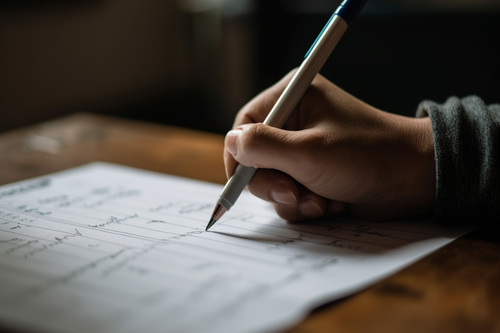Table of Contents
- Creating a strategic revision timetable
- Harness the power of learning maps
- Choosing the right study environment
- Adapting your study schedule to your lifestyle
- Embracing the power of past papers
- Compiling effective summary notes
- Harness the power of group study
- Balancing rest, nutrition, and exercise
- Rewarding oneself
- Optimizing short-term memory for exam success
- Strategic approach to exam day
- Key takeaways
- FAQs
Preparing for international exams presents a unique set of challenges, the most significant of which is the requirement to align your study schedule with a different time zone. Exam success takes meticulous planning and adaptation to ensure you perform at your best when it counts the most. In this brief guide, we will look at important methods to assist you in effectively altering your study regimen so that you can confidently ace the exams.
The first critical step is to recognise the time zone difference when preparing for tests scheduled in a different time zone. This basic yet frequently disregarded factor can significantly impact your success. Failure to alter your study plan might result in sleep interruptions, increased stress, and impaired cognitive function on exam day. Recognizing the importance of this issue sets the way for executing successful strategies to align your study schedule with the scheduling of foreign exams.
To bridge the time difference between your home time zone and the time of the overseas exam, you must carefully adjust your study schedule. One crucial strategy is to gradually shift your study hours closer to the exam schedule over the course of several weeks. This gradual adjustment lessens the impact on your body’s internal clock and allows you to be more attentive and focused during the exam. Additionally, to acclimatize your mind and body to the new time zone, consider practicing mock exams or study sessions during the precise hours when the abroad exam will take place.
Creating a strategic revision timetable
Begin your journey to success by crafting a well-structured study routine. According to research, shorter study sessions combined with regular breaks are the most productive. Establish specific daily, weekly, and monthly goals to track your progress toward the exam date. This methodical technique keeps you on track and maximizes your study time.
Harness the power of learning maps
Visualizing your learning materials can improve your comprehension and recall significantly. Use colorful mind maps, Venn diagrams, and subject trees to organize and clarify the topics you need to address. These illustrations help students understand complicated concepts and uncover connections between many subject areas.
Choosing the right study environment
Choosing the best study environment is necessary for effective learning. While most individuals prefer calm, distraction-free environments such as libraries or cozy cafes, picking an area that suits your individual study style is critical. The goal is to find an environment that allows you to concentrate and absorb knowledge efficiently.
Adapting your study schedule to your lifestyle
Your study schedule should be consistent with your regular activities and commitments. If you are a full-time student, you may have more freedom for extended study periods. Even if you have plenty of time, arranging your study sessions is critical to avoid fatigue. If you have to balance work and family responsibilities, you will need to study when and where you can. In this instance, creating a well-organized study plan that fits your specific schedule, including breaks and reflection time is critical.
Embracing the power of past papers

Before getting into in-depth subject revision, familiarize yourself with previous test papers. While you may only attempt them after a period of time, this stage gives you an idea of the exam format and standards. Once you’ve finished the curriculum, start solving these papers under timed conditions. They provide great practice and allow you to track your development.
Compiling effective summary notes
Summarizing theories and information in your own words is a vital step many students overlook. Create summary notes in notebooks or on flashcards to consolidate your knowledge. This technique not only reinforces your understanding but also helps you remember information.
Harness the power of group study
Studying with people of the same interests can be quite beneficial. During breaks, study groups provide a forum for clarifying doubts and maintaining motivation.
Balancing rest, nutrition, and exercise
Taking frequent breaks during study sessions is essential for your well-being. Adequate rest, a well-balanced diet, and regular exercise improve physical and cognitive health. These techniques help to reduce stress, enhance confidence, and promote general mental health.
Rewarding oneself
Reward yourself when you achieve your revision goals. Whether it’s an outing to the movies, a night out with friends, or a shopping spree, celebrating your accomplishments can boost motivation and keep you in a positive frame of mind throughout your academic journey.
Optimizing short-term memory for exam success
Focus on revisiting important topics and ways to improve your short-term memory as the exam date approaches. There is a better time to delve into in-depth theory; instead, focus on polishing your exam abilities and reinforcing vital knowledge.
Strategic approach to exam day
Start with the easy questions in the exam hall to gain confidence and set a comfortable pace. To maximize efficiency, keep your responses matched with the specific requirements of each question.
Key takeaways
- Recognise the significance of modifying your study schedule to correspond with the time zone of overseas exams in order to minimize sleep disturbances and perform at your best.
- Over several weeks, gradually shift your study schedule closer to the exam time to minimize the influence on your internal clock and increase concentration during the exam.
- To maximize productivity, develop an organized study routine that includes shorter study periods, regular breaks, and daily, weekly, and monthly goals.
- Use colorful mind maps, Venn diagrams, and subject trees to organize and comprehend complicated study materials visually.
- Whether it’s a quiet library or a cozy café, choose a study atmosphere that suits your way of learning.
- Make rest, nutrition, and exercise a priority throughout exam preparation to enhance overall mental and physical health, lowering stress and increasing confidence.
Liked this article? Know more about TOEFL | 5 useful tips on how to prepare for TOEFL with detailed study plans
FAQs
Q- How can one keep himself motivated while modifying the study schedule for an international exam and dealing with time zone issues?
Set specific goals, divide your study sessions into reasonable parts, and reward yourself for reaching milestones to stay motivated.
Q- Is it important to practice studying in the new time zone during the specific exam time?
While it is not always practical to study during the exact exam hour in the new time zone, doing so sometimes can be beneficial. This allows your body and mind to adjust to the time change, making it simpler to do well throughout the exam.
Q- What tactics can you recommend for dealing with jet lag and staying alert during my overseas exam preparation?
Combat jet lag by gradually changing your sleep routine to the time zone of your destination before traveling. Stay hydrated, avoid caffeine, and eat a well-balanced diet to stay attentive and incorporate brief, regular breaks within your study regimen.






